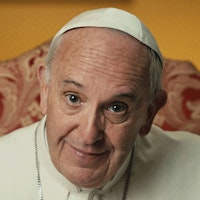And what is tenderness? It is the love that comes close and becomes real. It is a movement that starts from our heart and reaches the eyes, the ears and the hands.
Pope Francis

The Revolution of Tenderness
Topic: Love, Compassion, & Kindness
The third message I would like to share today is, indeed, about revolution: the revolution of tenderness. And what is tenderness? It is the love that comes close and becomes real. It is a movement that starts from our heart and reaches the eyes, the ears and the hands. Tenderness means to use our eyes to see the other, our ears to hear the other, to listen to the children, the poor, those who are afraid of the future. To listen also to the silent cry of our common home, of our sick and polluted earth. Tenderness means to use our hands and our heart to comfort the other, to take care of those in need.
Pope Francis (born Jorge Mario Bergoglio; 17 December 1936 – 21 April 2025) was head of the Catholic Church and sovereign of the Vatican City State from 13 March 2013 until his death in 2025. He has the distinction of being the first pope to be a member of the Society of Jesus (Jesuits), and he is the first from the Americas and the Southern Hemisphere. Additionally, he is the first pope born or raised outside Europe since the 8th-century papacy of Syrian pope Gregory III.
Before becoming Pope, Francis led a significant career within the Church, known for his humility, emphasis on God's mercy, concern for the poor, and commitment to interfaith dialogue. His papacy has been marked by a shift towards more open and compassionate stances on social issues such as immigration, the environment, and the importance of inclusivity within the Church.
Pope Francis continues to be a transformative figure in the Catholic Church, encouraging dialogue, compassion, and a renewed focus on social justice. His groundbreaking leadership as the first Jesuit pope and his connections to various firsts in the history of the Papacy reflect a commitment to bridging gaps and fostering understanding across different cultures and traditions. His teachings and actions resonate with millions around the world, making him one of the most influential religious leaders of our time.
TED2017
Pope Francis. “Why the Only Future Worth Building Includes Everyone.” TED: Ideas Worth Spreading, Apr. 2017, www.ted.com/talks/pope_francis_why_the_only_future_worth_building_includes_everyone, [Pope Francis, TED Talk (April, 2017)]

Pope Francis
Theme: Compassion

About This Pope Francis Quotation [Commentary]
Pope Francis places this line within “the third message” of his TED talk: “the revolution of tenderness.” He asks, “And what is tenderness?” and answers in plain terms: “It is the love that comes close and becomes real.” In that sense, compassion is not an abstraction. It is a “movement that starts from our heart,” a movement that chooses nearness so love can become real in how we meet one another.
Pope Francis then keeps the sequence practical: this movement “reaches the eyes, the ears and the hands.” “Tenderness means to use our eyes to see the other, our ears to hear the other,” to “listen to the children, the poor, those who are afraid of the future.” He adds another kind of listening: “the silent cry of our common home, of our sick and polluted earth.” Tenderness trains attention—eyes that see, ears that hear—until “the other” is faced as a “you.”
He concludes by naming what tenderness does: “to comfort the other,” “to take care of those in need.” In the same message, Pope Francis is clear: “tenderness is not weakness; it is fortitude,” “the path of solidarity,” and “the path of humility.” The “revolution” he calls for is this steady practice of love that “comes close,” becomes “real,” and moves through heart, eyes, ears, and hands toward care.
Why the Only Future Worth Building Includes Everyone
In his TED 2017 video message, Pope Francis shapes three linked messages: first, that “the future is made of you, it is made of encounters,” because “life is not time merely passing by, life is about interactions,” and “we all need each other, none of us is an island,” so “we can only build the future by standing together, including everyone.” Second, he turns to science and technology: “How wonderful would it be if the growth of scientific and technological innovation would come along with more equality and social inclusion,” and if “solidarity… became… the default attitude,” helping us overcome a “culture of waste” that puts “products at their core, instead of people,” remembering that “the other is not a statistic or a number… The ‘you’ is always a real presence, a person to take care of.” Third, he names “the revolution of tenderness”: “the love that comes close and becomes real,” “a movement that starts from our heart and reaches the eyes, the ears and the hands,” so that we “use our eyes to see the other, our ears to hear the other,” and “use our hands and our heart to comfort the other, to take care of those in need.”
Pope Francis spoke about the future, the theme of the TED conference, expressing his wish that “the growth of scientific and technological innovation would come along with more equality and social inclusion.” [Here are a few excerpts from his talk.]
“How wonderful would it be if solidarity, this beautiful and, at times, inconvenient word, were not simply reduced to social work, and became, instead, the default attitude in political, economic and scientific choices, as well as in the relationships among individuals, peoples and countries… Only by educating people to a true solidarity will we be able to overcome the ‘culture of waste,’ which doesn’t concern only food and goods but, first and foremost, the people who are cast aside by our techno-economic systems which, without even realizing it, are now putting products at their core, instead of people…
Good intentions and conventional formulas, so often used to appease our conscience, are not enough… Let us help each other, all together, to remember that the other is not a statistic or a number. The other has a face. The ‘you’ is always a real presence, a person to take care of.”
“The third message I would like to share today is, indeed, about revolution: the revolution of tenderness. And what is tenderness? It is the love that comes close and becomes real. It is a movement that starts from our heart and reaches the eyes, the ears and the hands. Tenderness means to use our eyes to see the other, our ears to hear the other, to listen to the children, the poor, those who are afraid of the future. To listen also to the silent cry of our common home, of our sick and polluted earth. Tenderness means to use our hands and our heart to comfort the other, to take care of those in need.
Tenderness is the language of the young children, of those who need the other. A child’s love for mom and dad grows through their touch, their gaze, their voice, their tenderness. I like when I hear parents talk to their babies, adapting to the little child, sharing the same level of communication. This is tenderness: being on the same level as the other. God himself descended into Jesus to be on our level. This is the same path the Good Samaritan took. This is the path that Jesus himself took. He lowered himself, he lived his entire human existence practicing the real, concrete language of love.
Yes, tenderness is the path of choice for the strongest, most courageous men and women. Tenderness is not weakness; it is fortitude. It is the path of solidarity, the path of humility.”
“The future of humankind isn’t exclusively in the hands of politicians, of great leaders, of big companies,” he said. “Yes, they do hold an enormous responsibility. But the future is, most of all, in the hands of those people who recognize the other as a ‘you’ and themselves as part of an ‘us.’ We all need each other.”
—Pope Francis. “Why the Only Future Worth Building Includes Everyone.” TED: Ideas Worth Spreading, Apr. 2017.
Resources
Related Quotes
Copyright © 2017 – 2026 LuminaryQuotes.com About Us